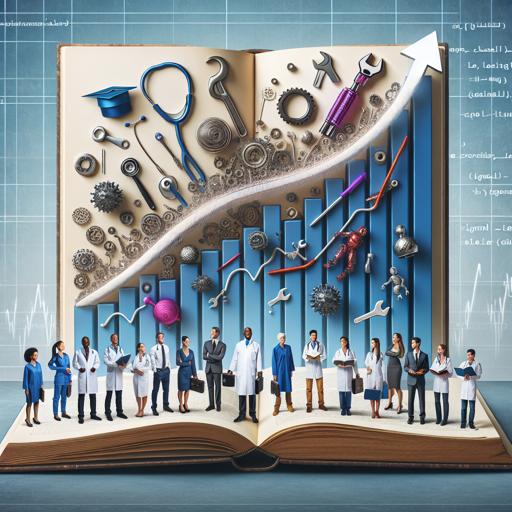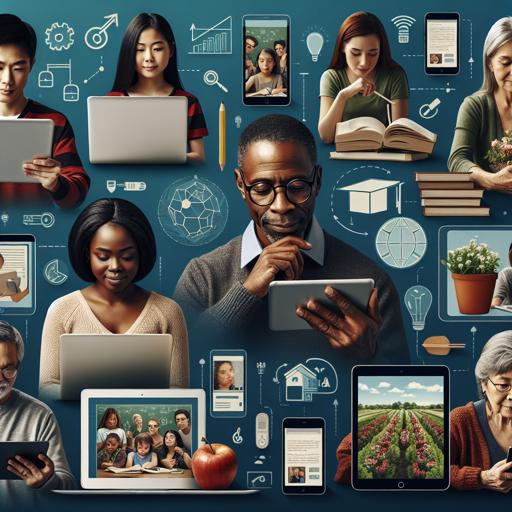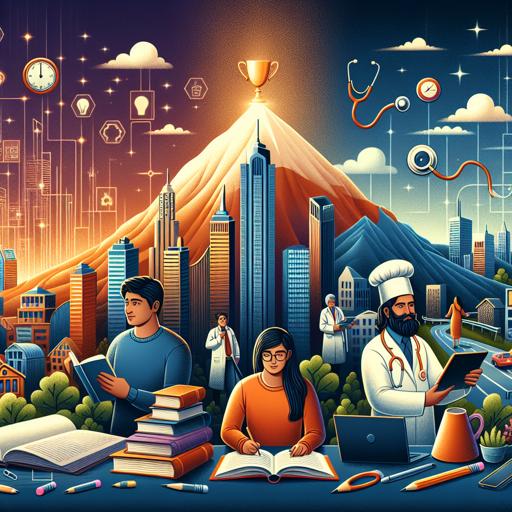In today’s rapidly evolving world, embracing lifelong learning for career growth has become not just an option, but a necessity. As industries transform and new technologies emerge, the ability to continuously acquire new skills and knowledge is crucial for staying competitive and relevant.
Lifelong learning empowers individuals to adapt to change, seize new opportunities, and navigate the complexities of modern careers. This mindset fosters personal and professional growth, enabling individuals to thrive in dynamic environments. Join us as we explore the importance of lifelong learning and how it can unlock new pathways for career advancement and fulfillment.
The importance of lifelong learning in today’s job market

In the kaleidoscopic world of today’s job market, the traditional notion of education as a mere precursor to employment is losing its sheen faster than last year’s tech gadget. Once viewed as a linear journey from the classroom to the conference room, the career path now resembles more of a dynamic dance, demanding moves that are constantly redefined and mastered. Enter the realm of lifelong learning—an invigorating pursuit that promises intellectual prosperity and career resilience.
Embracing this philosophy isn’t just a trend; it’s the new modus operandi for professionals intent on making their mark while keeping pace with the brisk, ever-evolving marketplace. Consider the ambitious professional navigating the modern career landscape as a seasoned traveler equipped with a versatile map.
With industries undergoing transformational change at breakneck speeds—thanks in no small part to digital disruption and globalization—possessing a single set of skills is about as useful as relying on a sundial in a New York subway. Engaging in continuous learning offers the possibility to adapt and thrive amidst such flux, opening doors to roles that are innovative and, in some cases, yet to exist.
Whether it’s mastering new digital tools, understanding emerging business models, or acquiring soft skills like emotional intelligence and effective communication, the commitment to never stand still translates directly into maintaining relevancy and securing competitive advantage. Furthermore, this approach fosters a unique culture of curiosity and flexibility, traits highly sought after by modern employers who themselves are striving to future-proof their organizations. Engaging in lifelong learning isn’t solely about acquiring new credentials; it’s about adopting a mindset open to experimentation, evolution, and collaboration.
Think of it as your ticket to a professional renaissance, where reinventing one’s skill set and knowledge becomes both an art and a necessity. By continually opting into this cycle of learning, you not only invest in your career growth but also contribute to a broader narrative of innovation and progress, remaining agile enough to pivot as needed in a world that waits for no one.
Strategies for incorporating lifelong learning into your career

In the perpetual race of career advancement, embracing lifelong learning is not just a luxury—it’s a strategic necessity. The world of work is akin to a swiftly revolving carousel, where staying stagnant means risk of being outpaced by more agile peers.
Integrating continuous learning into your professional life is akin to equipping yourself with an ever-evolving toolkit, ready to tackle the multi-faceted challenges of a dynamic job market. Imagine it as a vibrant, ongoing conversation with your career, one where every new skill or piece of knowledge you acquire adds a new layer of depth to your expertise and enhances your professional persona. To master this perpetual growth mindset, start by weaving intentional learning opportunities into your everyday routine.
This can be as simple as allocating just fifteen minutes a day to delve into industry news, or dedicating an hour a week to online courses that expand your skills beyond the immediate requirements of your current role. These seemingly minor investments compound over time, empowering you with a broader perspective and a more diverse skill set. Consider executives who evolve into thought leaders by voraciously reading not just business journals, but also literature that challenges their thinking and stirs creativity; or tech professionals who gather insights from fields as disparate as anthropology or music theory to innovate fearlessly in their own domains.
Take advantage of technology as your learning ally, harnessing the potential of podcasts, webinars, and digital platforms that offer a wealth of knowledge right at your fingertips. Engaging with diverse learning modalities not only strengthens your cognitive flexibility but also keeps you intellectually curious.
Moreover, seek out mentorship and networking opportunities—these interactions often provide real-world insights that no textbook can offer. A career enriched by lifelong learning isn’t merely a job well done; it’s an ongoing journey of personal growth that prepares you for the unpredictable yet exciting road ahead, turning every professional obstacle into an opportunity for transformation and success.
The role of technology in facilitating continuous education

In the ever-evolving landscape of professional development, technology stands like a seasoned maestro, orchestrating a symphony of resources that cater to our ceaseless quest for knowledge. Imagine a world where learning is no longer confined to dusty tomes or traditional classrooms but is instead a vibrant, dynamic experience that fits snugly in the palm of your hand.
This is the era we now inhabit, thanks to the impressive strides in technological advancements. As we gracefully waltz into this brave new world, the concept of lifelong learning for career advancement takes center stage, transforming how we perceive education in our professional lives. Consider, for instance, how online platforms have revolutionized access to information.
With just a few clicks, individuals can enroll in courses offered by prestigious universities, bridging geographical distances that once posed formidable barriers to educational pursuits. This democratization of learning empowers everyone, from the eager novice to the seasoned veteran, to continually acquire new skills and knowledge.
Technologies such as virtual and augmented reality are upping the ante, providing immersive learning experiences that not only captivate the senses but also significantly enhance understanding and retention. Through tailored, interactive modules, practitioners can gain hands-on experience in fields as diverse as medicine, engineering, and the arts without ever leaving their homes. Moreover, the role of artificial intelligence in personalizing the educational journey cannot be overstated.
AI tools assess learning patterns and preferences to deliver customized content that aligns closely with individual goals and career aspirations. This level of personalization ensures that each learning curve is as efficient and enjoyable as possible, fueling a passion for lifelong exploration and self-improvement. In essence, technology doesn’t just facilitate education; it elevates it to a state where continuous learning becomes an exhilarating adventure rather than a chore.
By crafting a seamless blend of accessibility and relevance, technology indeed serves as the steadfast engine propelling us toward an enriched professional and personal development trajectory. So, here’s to embracing endless learning that not only sustains but significantly enhances our career growth in this digital age.
Overcoming challenges in pursuing lifelong learning
Embarking on the thrilling journey of continuous education can sometimes resemble a daring expedition into the uncharted territories of personal and professional development. As you navigate the complex terrain of lifelong learning, you’ll encounter various obstacles disguised as time constraints, financial limitations, and an overwhelming array of choices.
Each has the potential to thwart your progression, yet they also offer unique opportunities to enhance your strategic thinking and adaptability. By embracing this learning odyssey, you effectively arm yourself with the skills needed for career evolution and expand your intellectual horizons. In doing so, you’re not merely collecting knowledge but cultivating an agile mindset capable of responding proactively to the ever-changing demands of today’s competitive job market.
Let’s not sugarcoat the facts; pursuing non-stop education alongside existing responsibilities can resemble juggling flaming torches on a unicycle. The secret lies in transforming potential distractions into allies.
Advanced technology plays a significant part, offering online courses that fit around personal schedules, and interactive platforms that replace stifling classroom settings with engaging digital experiences. Meanwhile, financial constraints can be cleverly circumvented through countless scholarships, grants, and low-cost courses offered by prestigious institutions. You’re not alone on this solitary trek; a supportive community of fellow learners thrives online, where knowledge exchanges and collaborative projects catalyze both personal friendships and professional networks.
Integrating lifelong learning into your career strategy is like planting seeds in an ever-fertile garden. As you grow proficient in new technologies, expand your expertise, and remain informed about industry trends, you cultivate a robust and diverse skill set that ensures your career remains as relevant as the latest tech gadget. Moreover, each conquered learning milestone becomes a stepping stone towards greater professional satisfaction and achievement.
Remember that true mastery is a moving target; with each stride in continuous education, you are not only embracing growth but also positioning yourself as an indispensable asset within any organizational landscape. By overcoming the challenges inherent in lifelong learning, you don a cape of resilient passion, ready to soar above any limits in your career journey.
Measuring the impact of lifelong learning on career advancement
In today’s rapidly evolving job market, the charm of lifelong learning lies in its ability to act as a magical compass, guiding one towards new horizons of career growth. The digital age has transformed the landscape of work so thoroughly that skills can become outdated almost as soon as the ink on a diploma dries. Embracing perpetual education becomes not just a strategy but a necessity for those seeking long-term success and satisfaction in their professional lives.
It’s akin to upgrading the operating system of your career, ensuring smooth functionality and compatibility with future challenges. By continuously acquiring knowledge and refining skills, professionals not only increase their adaptability; they also build a versatile toolset that heightens their value in their current roles and widens their prospects for advancement.
Moreover, this ongoing quest for knowledge serves as a catalyst for both personal and professional metamorphosis. It allows individuals to reinvent themselves, pivot into new career paths, or ascend the corporate ladder with renewed vigor. Consider the tech industry, where programming s and frameworks emerge at a dizzying pace.
A software developer who commits to learning new s or mastering emerging technologies thrives in a competitive environment. Similarly, a marketing professional who stays abreast of digital trends and analytics tools positions themselves as a go-to expert, ready to tackle complex challenges and lead innovative projects.
Lifelong learning becomes the passport that allows individuals access to uncharted territories of career advancement, each new skill a stamp bringing them closer to their professional zenith. The ability to learn, unlearn, and relearn is the ultimate asset, transforming potential from an abstract concept into tangible achievements. Such dedication not only enhances one’s skillset but also transforms an ordinary career into an extraordinary journey of continual evolution.
Nasza rekomendacja wideo
Podsumowanie
Embracing lifelong learning is crucial for career growth in today’s rapidly evolving job market. By continuously updating skills and knowledge, professionals can stay competitive, adapt to industry changes, and unlock new opportunities. Lifelong learning fosters innovation, enhances job satisfaction, and ensures long-term career success.
Commit to ongoing education to remain relevant and achieve your professional goals.
Najczęściej zadawane pytania
How can lifelong learning contribute to career advancement in today’s rapidly changing job market?
Lifelong learning enables individuals to continuously update their skills and knowledge, making them adaptable and competitive in today’s rapidly evolving job market.
Sure, please provide the question you’d like me to answer.
What are some effective strategies for integrating lifelong learning into a busy professional schedule?
Effective strategies for integrating lifelong learning into a busy professional schedule include setting specific learning goals, leveraging microlearning resources, utilizing commute or downtime for educational podcasts or audiobooks, and scheduling regular, dedicated time blocks for learning activities.
Sure, please provide the question you’d like me to answer.
How does embracing lifelong learning enhance adaptability and resilience in the face of industry disruptions?
Embracing lifelong learning enhances adaptability and resilience in the face of industry disruptions by equipping individuals with the continuous skills and knowledge needed to navigate and thrive amidst changing environments.
Of course! Please provide the question you’d like me to answer.
What role do online courses and digital platforms play in facilitating lifelong learning for career growth?
Online courses and digital platforms provide accessible, flexible, and diverse learning opportunities that enable individuals to continuously update their skills and knowledge, essential for career growth and adaptation in a rapidly changing job market.
Sure, please provide the question you’d like me to answer.
How can employers support and encourage a culture of lifelong learning within their organizations?
Employers can support and encourage a culture of lifelong learning by providing access to continuous education opportunities, fostering a growth mindset, and recognizing and rewarding learning achievements.
Of course! Please provide the question you’d like me to answer.
What are the potential challenges of lifelong learning, and how can individuals overcome them to achieve career success?
Potential challenges of lifelong learning include time constraints, financial costs, and staying motivated, which individuals can overcome by setting clear goals, leveraging online resources, and cultivating a growth mindset to achieve career success.
